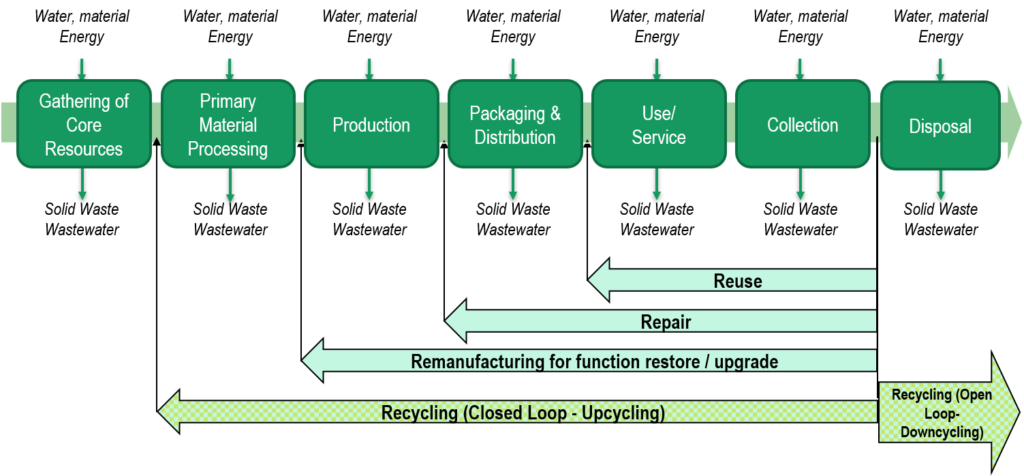Circular Economy aims at establishing a new sustainable development path by decoupling economic growth and resource consumption, showing potentials to generate new business opportunities in worldwide economies and significantly increase resource efficiency in industrial systems. The vision of Circular Economy is to change dramatically the current linear “take–make–dispose” economic approach, which causes massive waste flows. In contrast, the Circular Economy paradigm brings restorative and regenerative approaches by intention and design.

However, a structural gap between this circular economy vision and the current industrial practices exists. Circular Economy model is nowadays effective and economically sustainable only for simple products and for specific classes of materials, for example steel. The current trend towards the emergence of smart products with embedded intelligence, poses significant challenges to the implementation of sustainable circular economy practices in the future.
The main limitation of the current model is that manufacturing and de-and remanufacturing operations are carried out independently and in “silos” without sharing information and economic benefits: this can be overcome only by rethinking the current European industrial system into new collaborative and sustainable value networks. The most interesting opportunity for establishing sustainable value networks for high value-added products is the creation of cross-sectorial circular value-chains, where the residual value of a product in its post-use phase is maximized by establishing alliances between stakeholders in different sectors and transferring the product components and materials from the original sectors into applications with different requirements in different sectors.

DigiPrime has the mission to develop a new concept of Circular Economy digital platform overcoming current information asymmetry among value-chain stakeholders, in order to unlock new circular business models based on the data-enhanced recovery and re-use of functions and materials from high value-added post-use products with a cross-sectorial approach.
The key assumption of DigiPrime, thoroughly validated through six cross-sectorial pilots and further detailed in twenty use-cases covering five different European industrial sectors, is that through a properly designed and implemented digital platform, collaboration and data sharing among stakeholders can be promoted thus making it possible to boost currently untapped high-added value cross-sectorial circular business cases.
The overall mission of the DigiPrime project will be accomplished by achieving the following specific objectives:
- To solve current information asymmetry among value-chain stakeholders by providing secure access to material, component and product information, thus unlocking cross-sectorial circular value-chains.
- To increase circular business profitability, by integrating within the platform specific service applications at value-chain level and operational level, exploiting the data sharing mechanisms of the platform.
- To establish four new cross-sectorial circular European value-chains for the remanufacturing and re-use of high added-value components (i.e. batteries, composite and techno-polymer parts, textile components, and mechatronics / electronics).
- To create the conditions for a wide European adoption of the digital platform.
- To leverage on existing platforms and components, still ensuring scalability, reusability and interoperability.
- To support standardization and legislation.
- To demonstrate at European scale the economic, social and environmental sustainability of new circular business models and services enabled by the platform.
The ambitious DigiPrime objectives will be reached starting from the development of an innovative digital platform, which constitutes the backbone of the entire project. The main features of the DigiPrime platform are:
- A Multi-node federation structure, replicable on different existing and new sectorial platform instances, which will support the future systematic creation of cross-sectorial circular value-chains.
- A Semantic data infrastructure, based on ontological repositories and semantic search, able to manage and standardize the Babel of information coming from heterogeneous nodes.
- A Data Policy Framework to ensure privacy, security, authentication and authorization policies to any information shared among registered users.

